Resume
PACU Nurse Cover Letter Examples

May 29, 2025
|
12 min read
Craft a compelling PACU nurse cover letter with these simple steps, and ensure your application is in "good condition." Highlight your recovery room skills and stand out in the hospital's hiring process with tailored tips and insights.
4.70 Average rating
Rated by 348 people
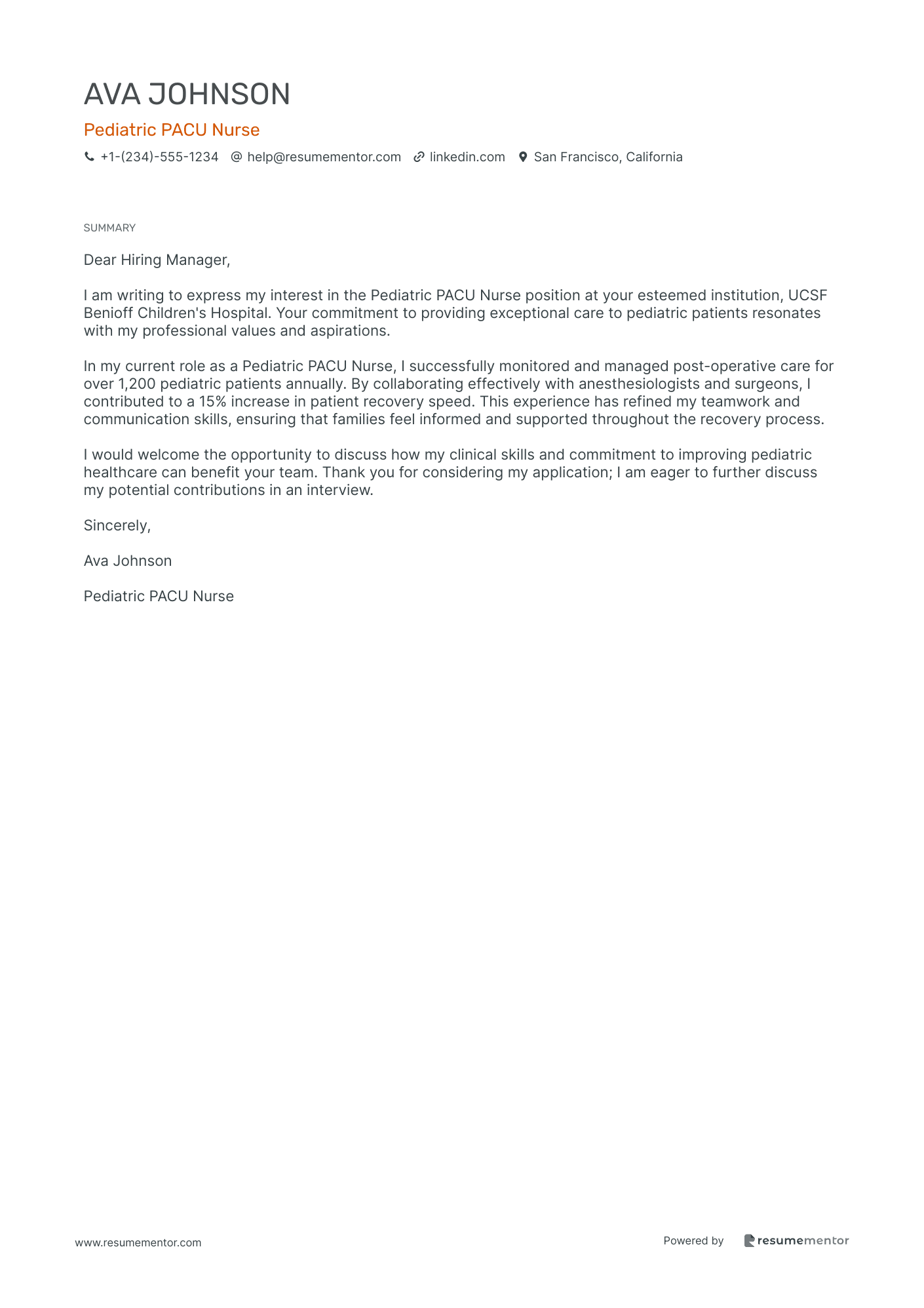
Pediatric PACU Nurse
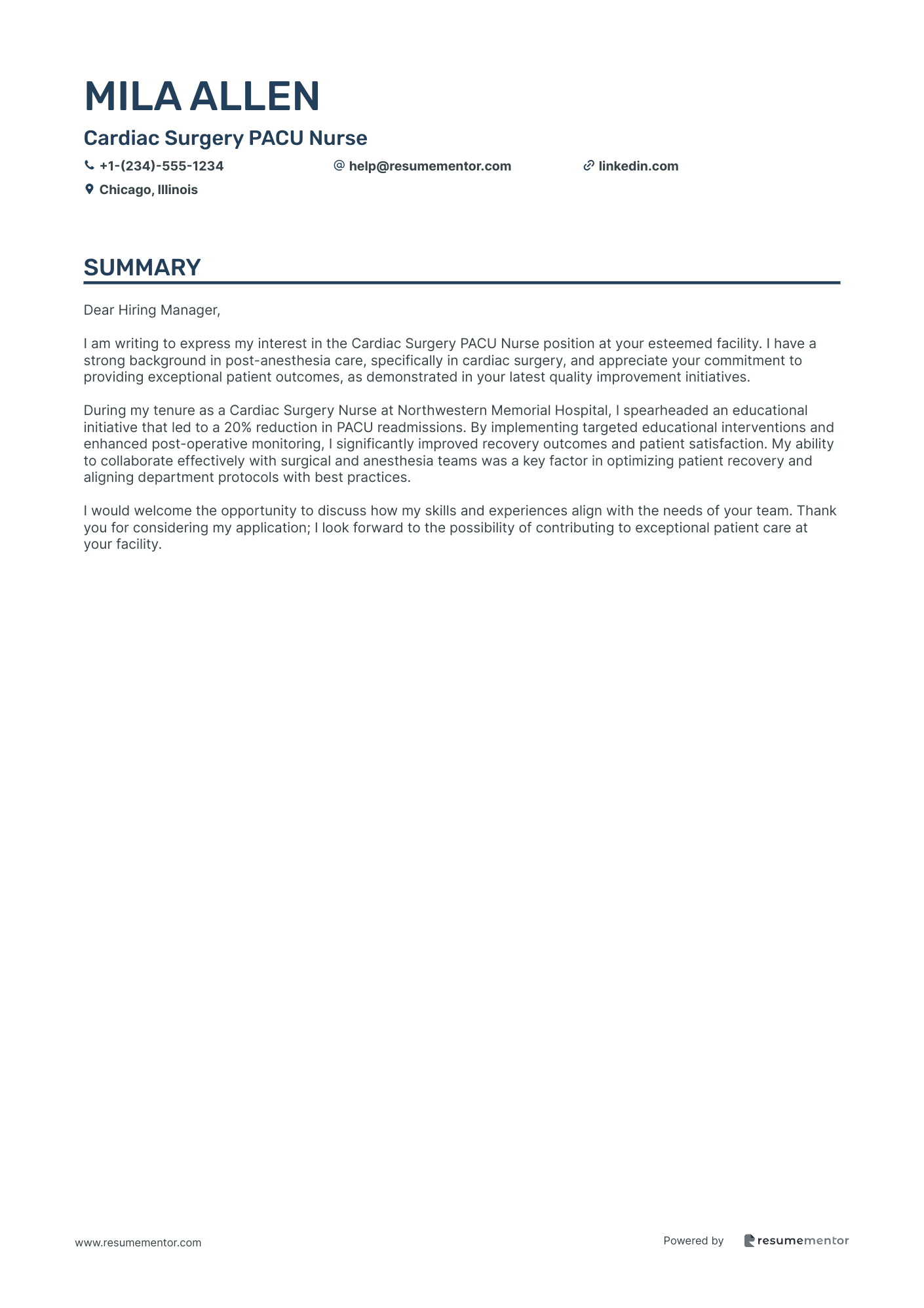
Cardiac Surgery PACU Nurse
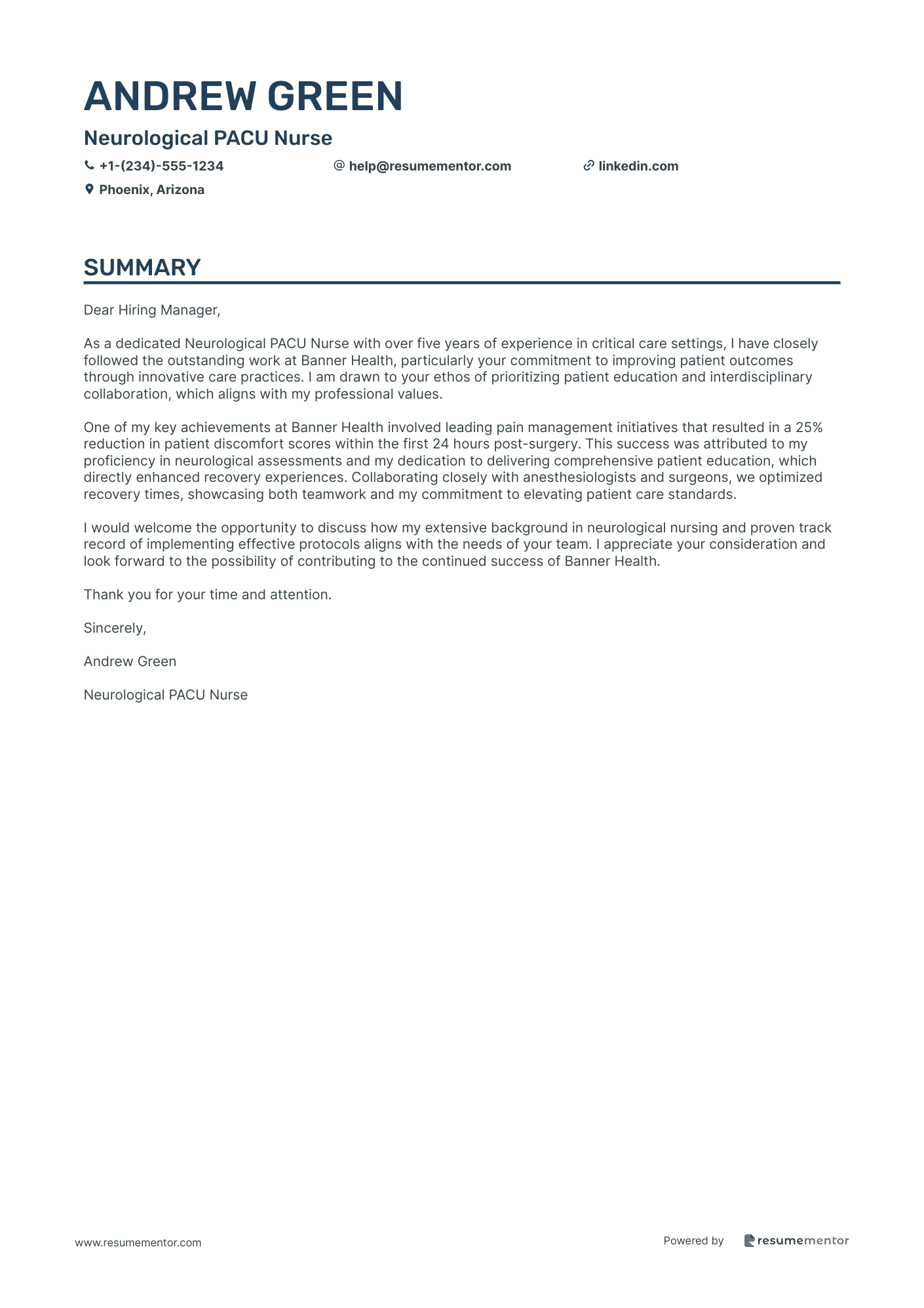
Neurological PACU Nurse
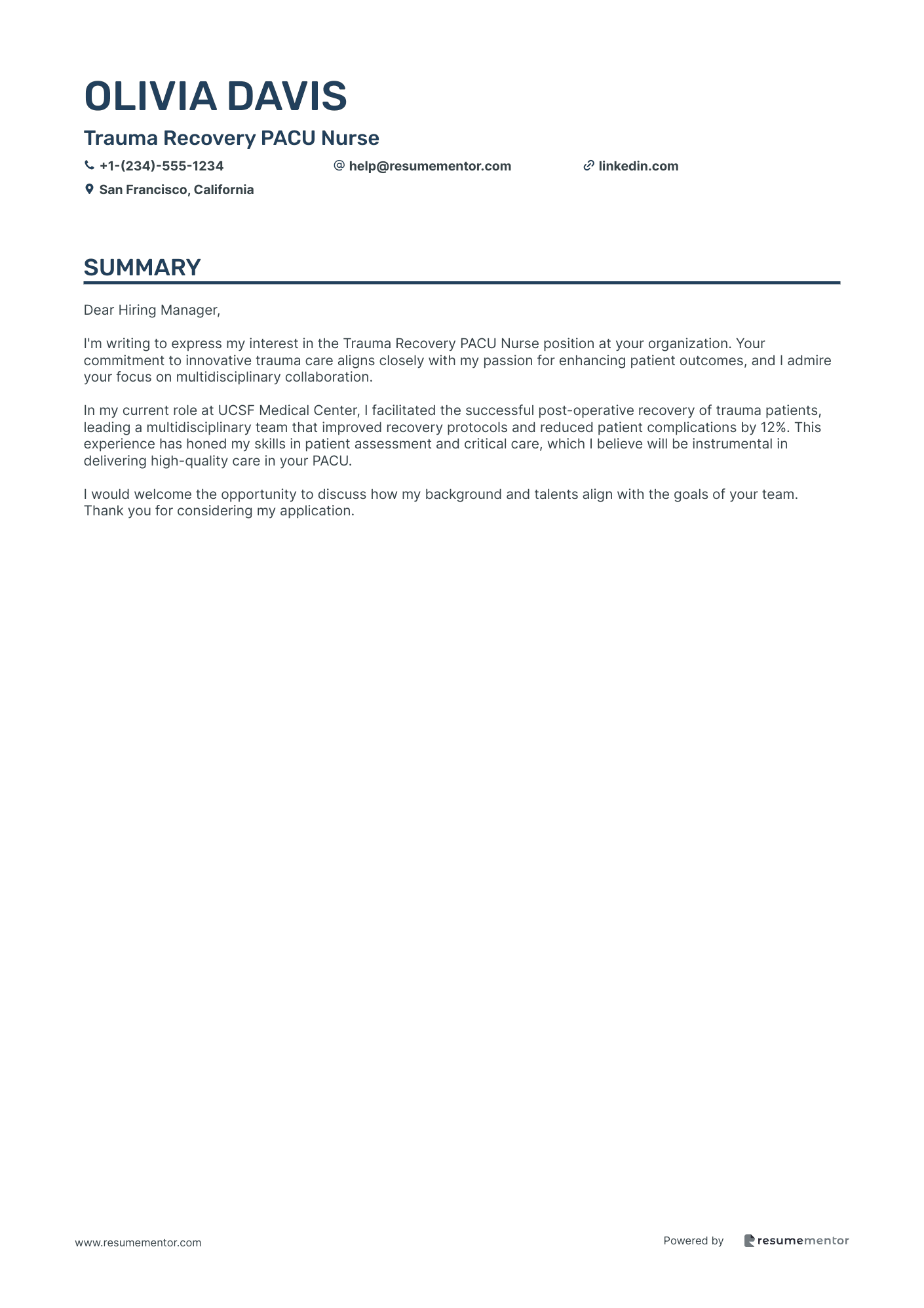
Trauma Recovery PACU Nurse
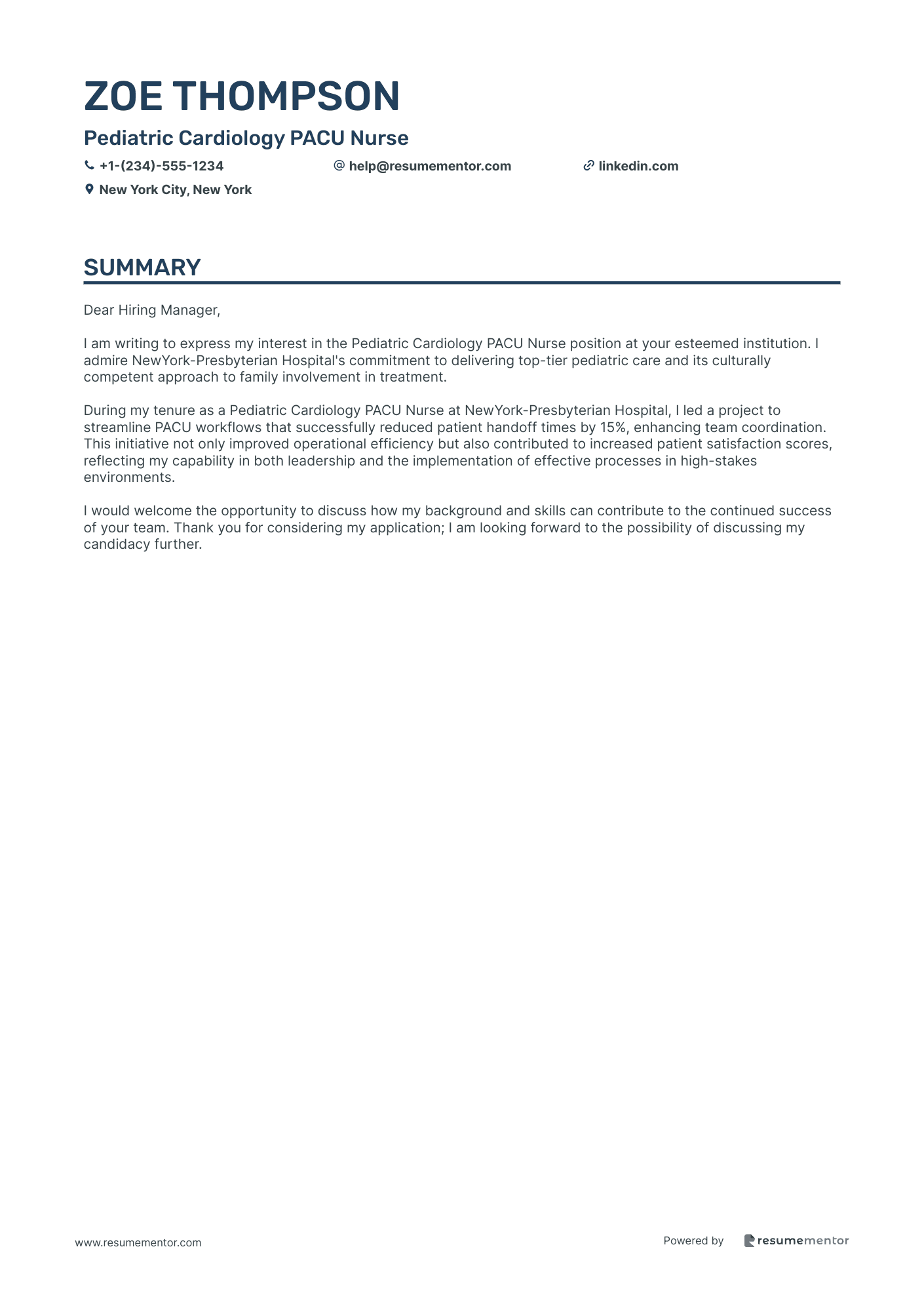
Pediatric Cardiology PACU Nurse
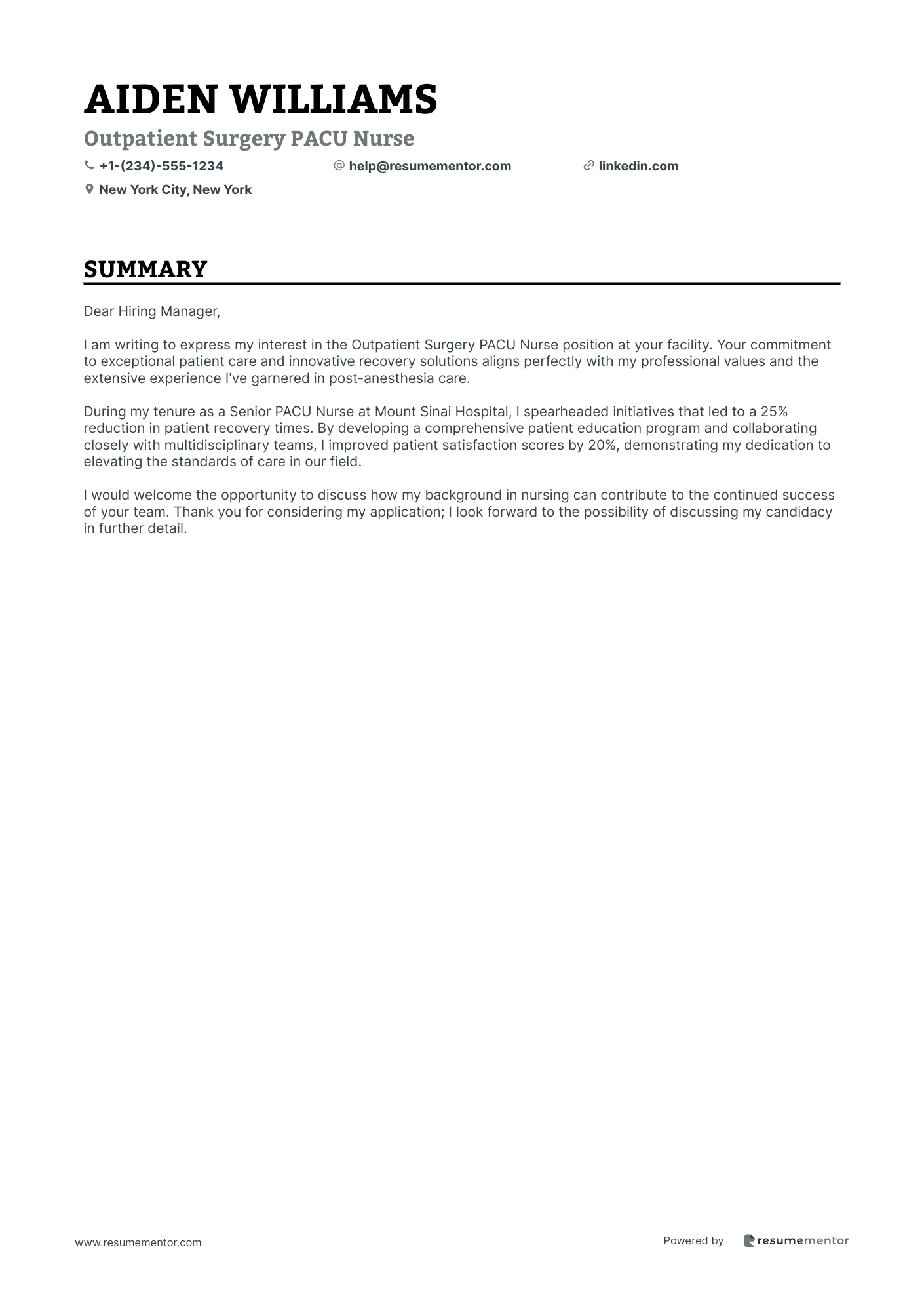
Outpatient Surgery PACU Nurse
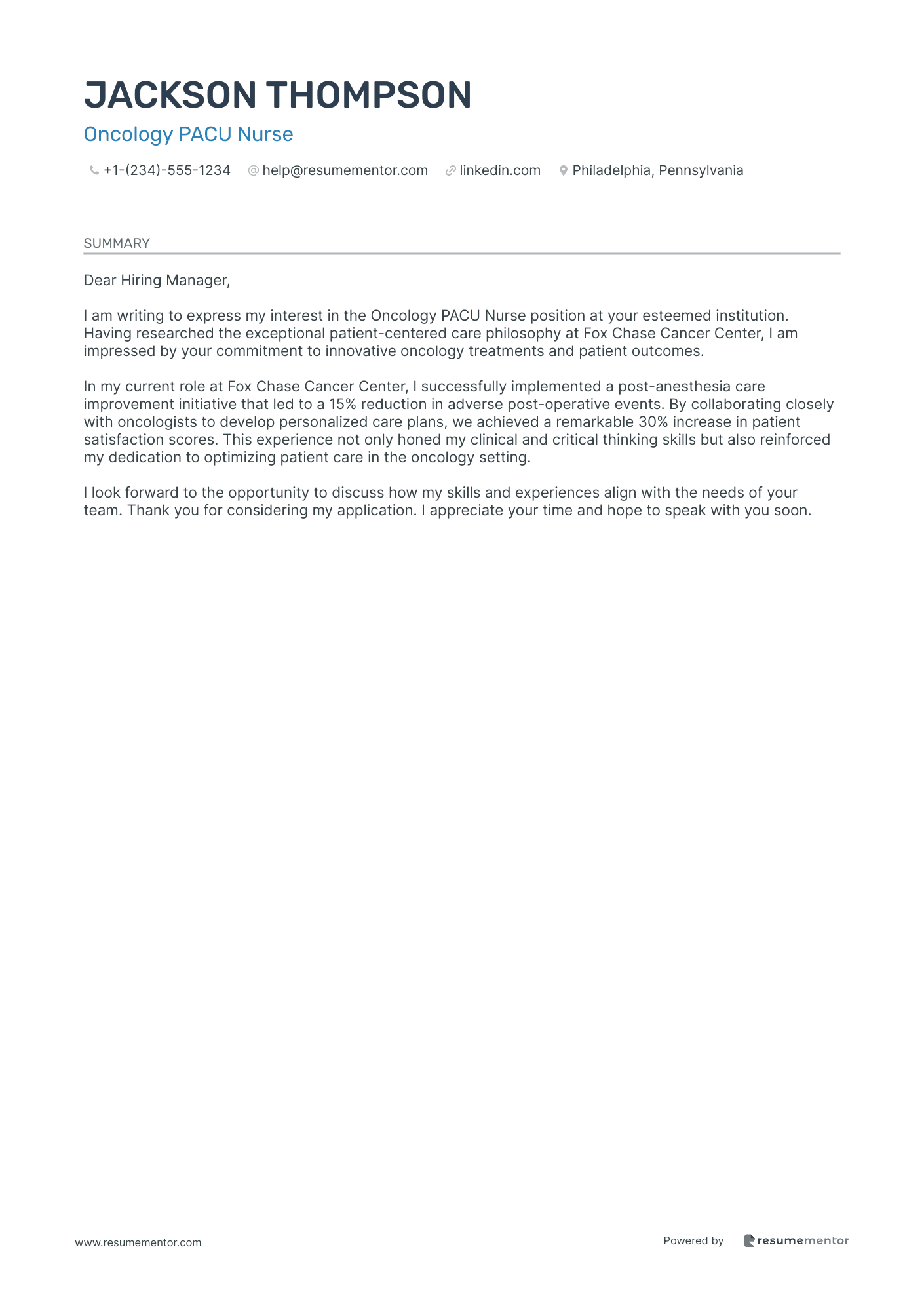
Oncology PACU Nurse
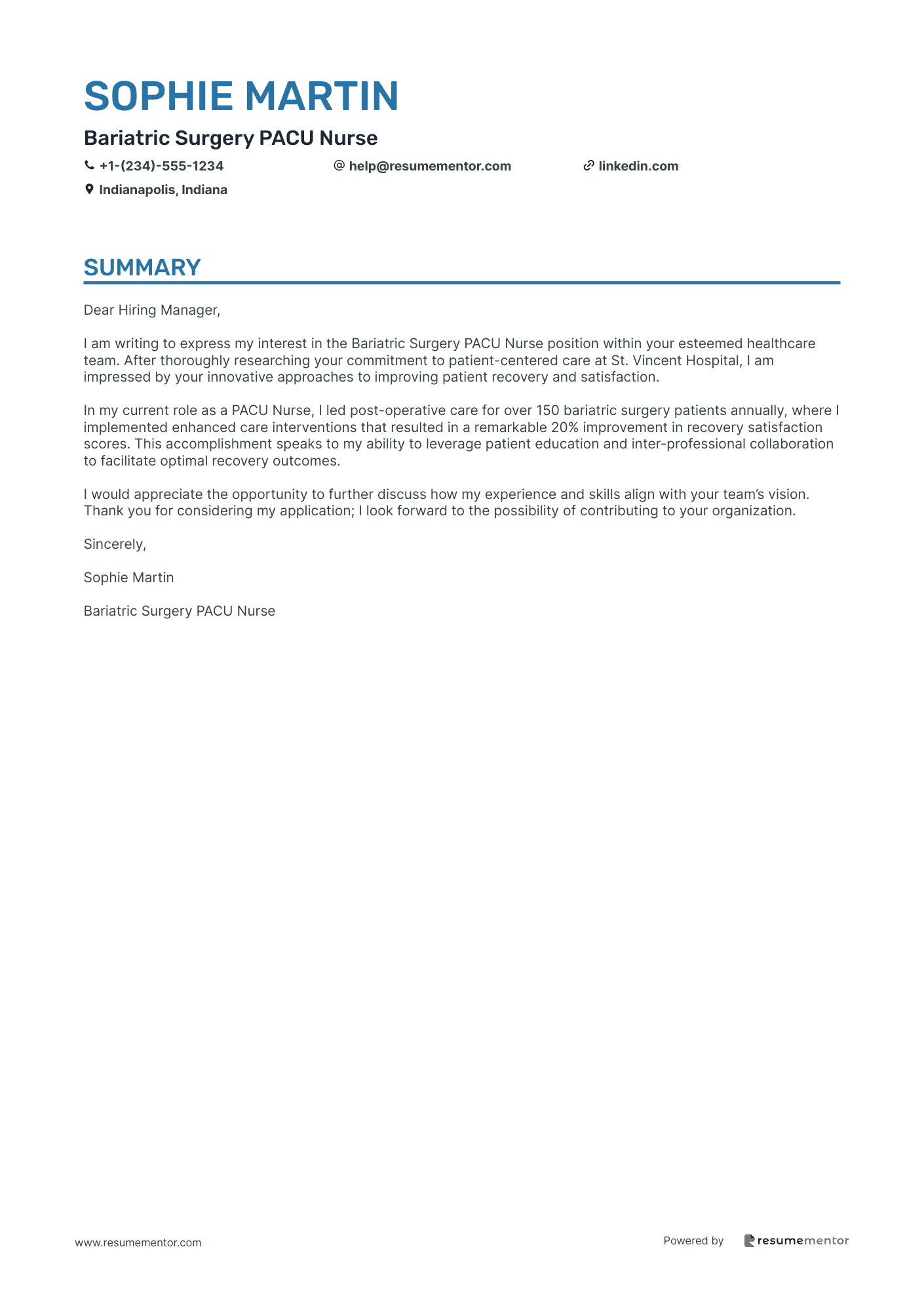
Bariatric Surgery PACU Nurse
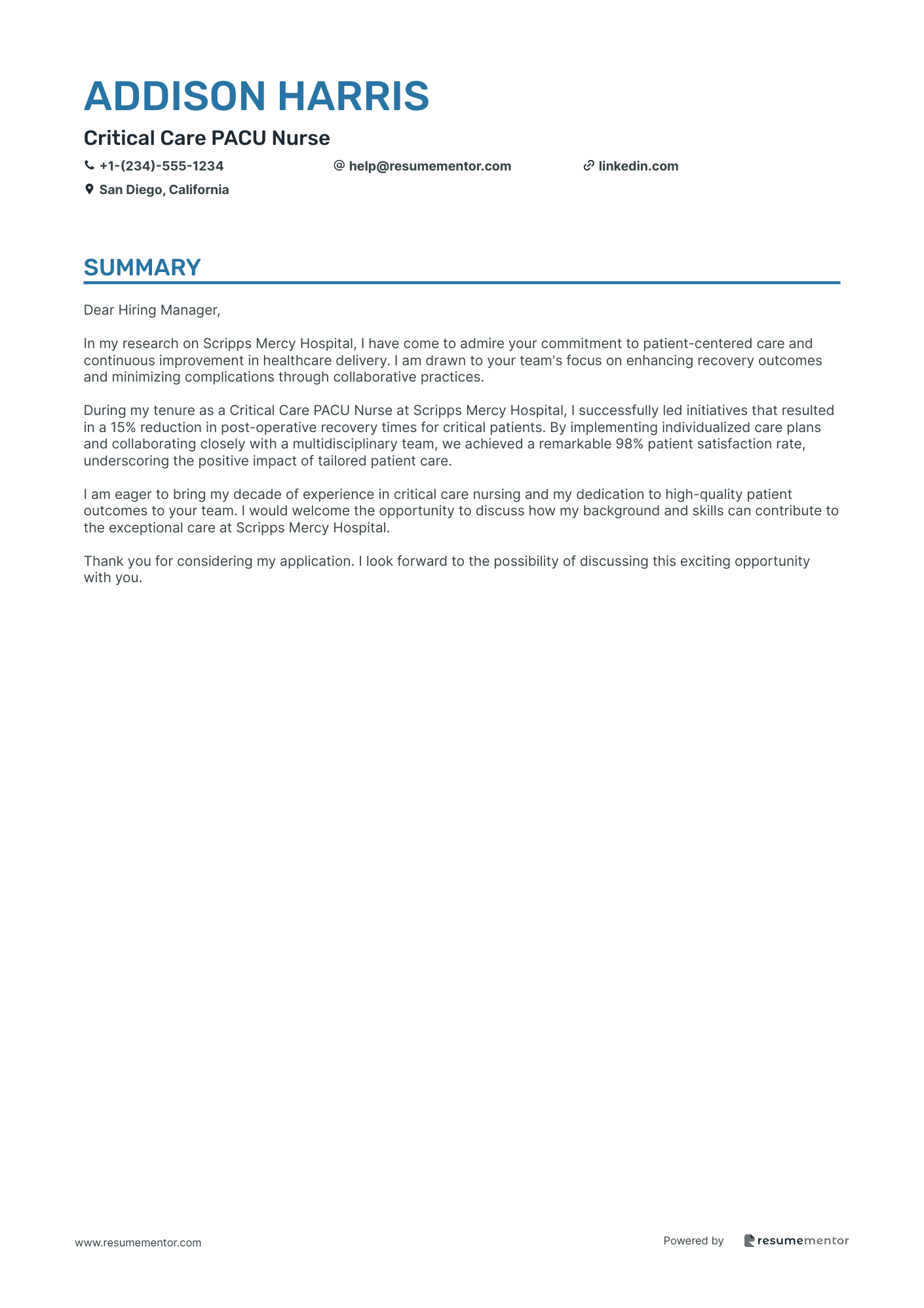
Critical Care PACU Nurse
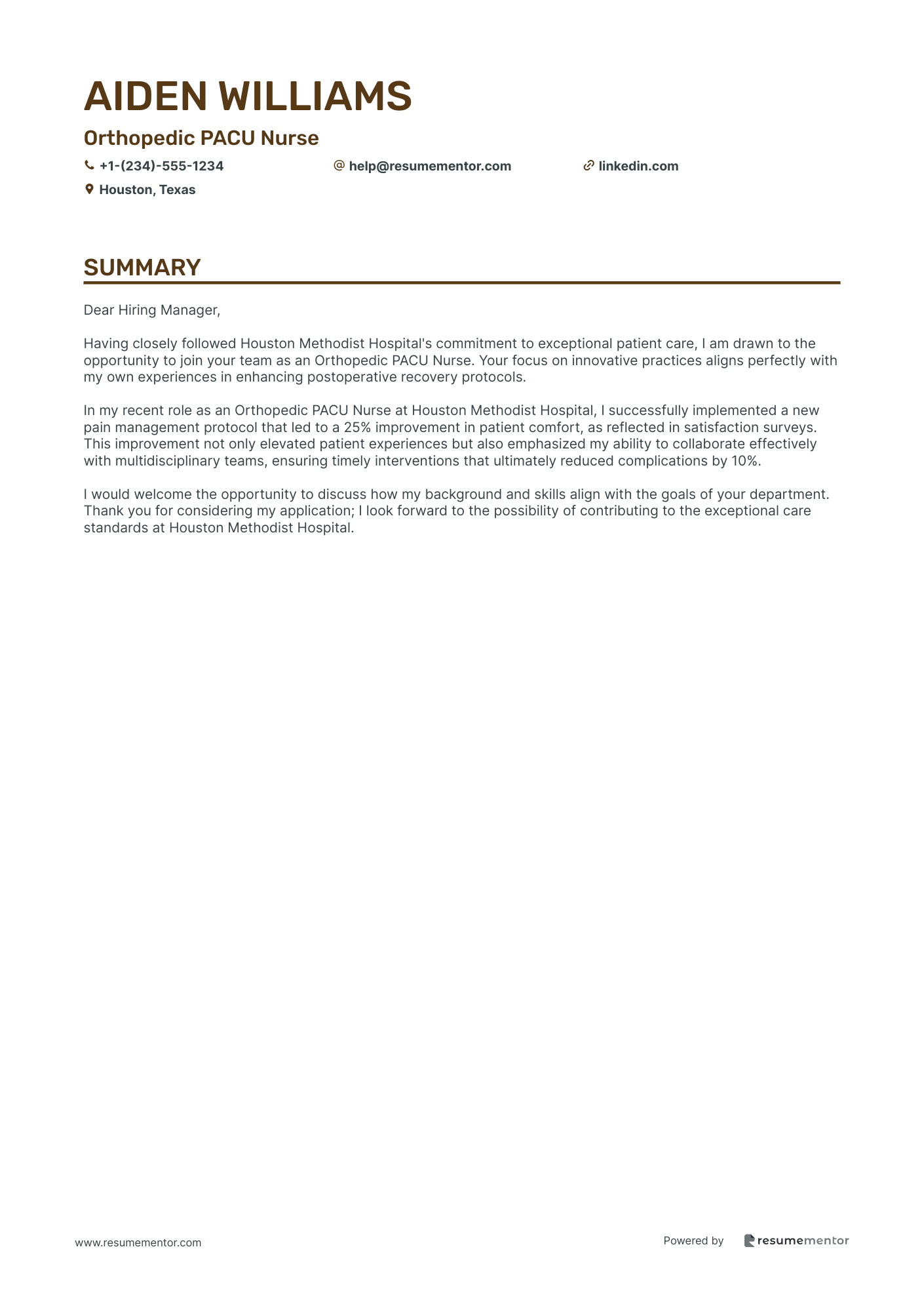
Orthopedic PACU Nurse

Pediatric PACU Nurse cover letter sample
When applying for this position, it's essential to highlight any previous experience in pediatric care or recovery settings. Demonstrating your proficiency in administering post-anesthesia care and monitoring vital signs is crucial. Include relevant certifications, such as Pediatric Advanced Life Support (PALS) or Basic Life Support (BLS), to show your commitment to ongoing education. Use the 'skill-action-result' framework to present how your nursing skills improved patient outcomes, eased family concerns, or minimized recovery times in your previous roles. This will strengthen your application.
Ava Johnson
Pediatric PACU Nurse
Summary
Dear Hiring Manager,
I am writing to express my interest in the Pediatric PACU Nurse position at your esteemed institution, UCSF Benioff Children's Hospital. Your commitment to providing exceptional care to pediatric patients resonates with my professional values and aspirations.
In my current role as a Pediatric PACU Nurse, I successfully monitored and managed post-operative care for over 1,200 pediatric patients annually. By collaborating effectively with anesthesiologists and surgeons, I contributed to a 15% increase in patient recovery speed. This experience has refined my teamwork and communication skills, ensuring that families feel informed and supported throughout the recovery process.
I would welcome the opportunity to discuss how my clinical skills and commitment to improving pediatric healthcare can benefit your team. Thank you for considering my application; I am eager to further discuss my potential contributions in an interview.
Sincerely,
Ava Johnson
Pediatric PACU Nurse
Cardiac Surgery PACU Nurse cover letter sample
When crafting your cover letter, emphasize your critical care nursing experience, especially in the post-anesthesia care unit. Highlight your proficiency in monitoring vital signs and managing post-operative pain, which are essential in this role. Include any specialized training in cardiac care or certifications such as Advanced Cardiac Life Support (ACLS). Provide examples of how your nursing interventions have improved patient outcomes or reduced recovery times. Use concrete metrics to show how your skills directly translated into enhanced patient safety or satisfaction in previous roles.
Mila Allen
Cardiac Surgery PACU Nurse
Summary
Dear Hiring Manager,
I am writing to express my interest in the Cardiac Surgery PACU Nurse position at your esteemed facility. I have a strong background in post-anesthesia care, specifically in cardiac surgery, and appreciate your commitment to providing exceptional patient outcomes, as demonstrated in your latest quality improvement initiatives.
During my tenure as a Cardiac Surgery Nurse at Northwestern Memorial Hospital, I spearheaded an educational initiative that led to a 20% reduction in PACU readmissions. By implementing targeted educational interventions and enhanced post-operative monitoring, I significantly improved recovery outcomes and patient satisfaction. My ability to collaborate effectively with surgical and anesthesia teams was a key factor in optimizing patient recovery and aligning department protocols with best practices.
I would welcome the opportunity to discuss how my skills and experiences align with the needs of your team. Thank you for considering my application; I look forward to the possibility of contributing to exceptional patient care at your facility.
Neurological PACU Nurse cover letter sample
When applying for this specialized nursing position, it’s important to showcase your experience in post-anesthesia care, particularly with neurological patients. Highlight any certifications like ACLS or PALS, as these skills are essential for critical situations. Emphasize your ability to monitor neurological status and recognize complications. Use specific examples of how your quick assessments and interventions improved patient outcomes. Also, detail any teamwork experiences in multidisciplinary settings to show your collaboration skills, as they greatly enhance patient care and operational efficiency.
Andrew Green
Neurological PACU Nurse
Summary
Dear Hiring Manager,
As a dedicated Neurological PACU Nurse with over five years of experience in critical care settings, I have closely followed the outstanding work at Banner Health, particularly your commitment to improving patient outcomes through innovative care practices. I am drawn to your ethos of prioritizing patient education and interdisciplinary collaboration, which aligns with my professional values.
One of my key achievements at Banner Health involved leading pain management initiatives that resulted in a 25% reduction in patient discomfort scores within the first 24 hours post-surgery. This success was attributed to my proficiency in neurological assessments and my dedication to delivering comprehensive patient education, which directly enhanced recovery experiences. Collaborating closely with anesthesiologists and surgeons, we optimized recovery times, showcasing both teamwork and my commitment to elevating patient care standards.
I would welcome the opportunity to discuss how my extensive background in neurological nursing and proven track record of implementing effective protocols aligns with the needs of your team. I appreciate your consideration and look forward to the possibility of contributing to the continued success of Banner Health.
Thank you for your time and attention.
Sincerely,
Andrew Green
Neurological PACU Nurse
Trauma Recovery PACU Nurse cover letter sample
When applying for this position, emphasize your clinical experience in post-anesthesia care to demonstrate familiarity with recovery processes. Highlight any certifications in trauma or critical care nursing as they underscore your qualifications. Strong assessment and patient management skills are crucial, so provide specific examples of how you've successfully monitored patients post-surgery. Use the 'skill-action-result' approach to illustrate how your interventions improved patient outcomes or reduced recovery times. Additionally, mention any training in pain management techniques to showcase your commitment to patient comfort.
Olivia Davis
Trauma Recovery PACU Nurse
Summary
Dear Hiring Manager,
I'm writing to express my interest in the Trauma Recovery PACU Nurse position at your organization. Your commitment to innovative trauma care aligns closely with my passion for enhancing patient outcomes, and I admire your focus on multidisciplinary collaboration.
In my current role at UCSF Medical Center, I facilitated the successful post-operative recovery of trauma patients, leading a multidisciplinary team that improved recovery protocols and reduced patient complications by 12%. This experience has honed my skills in patient assessment and critical care, which I believe will be instrumental in delivering high-quality care in your PACU.
I would welcome the opportunity to discuss how my background and talents align with the goals of your team. Thank you for considering my application.
Pediatric Cardiology PACU Nurse cover letter sample
When applying for this nursing role, emphasize any specialized training in pediatric care or critical care environments. Highlight your experience in managing post-anesthesia care, especially in pediatric patients with cardiac issues. Strong teamwork and communication skills with families and medical staff are essential, so showcase these abilities. If you've completed certifications like Pediatric Advanced Life Support (PALS) or similar, mention them. Provide examples of how your interventions improved patient recovery times or enhanced family support, demonstrating your impact through a 'skill-action-result' framework.
Zoe Thompson
Pediatric Cardiology PACU Nurse
Summary
Dear Hiring Manager,
I am writing to express my interest in the Pediatric Cardiology PACU Nurse position at your esteemed institution. I admire NewYork-Presbyterian Hospital's commitment to delivering top-tier pediatric care and its culturally competent approach to family involvement in treatment.
During my tenure as a Pediatric Cardiology PACU Nurse at NewYork-Presbyterian Hospital, I led a project to streamline PACU workflows that successfully reduced patient handoff times by 15%, enhancing team coordination. This initiative not only improved operational efficiency but also contributed to increased patient satisfaction scores, reflecting my capability in both leadership and the implementation of effective processes in high-stakes environments.
I would welcome the opportunity to discuss how my background and skills can contribute to the continued success of your team. Thank you for considering my application; I am looking forward to the possibility of discussing my candidacy further.
Outpatient Surgery PACU Nurse cover letter sample
When applying for this role, it’s essential to highlight any previous experience in post-anesthesia care. Emphasize your ability to monitor vital signs and respond quickly to patient needs. Showcase strong teamwork skills, as collaboration with surgeons and anesthesiologists is key. Mention any relevant certifications like Basic Life Support (BLS) or Advanced Cardiovascular Life Support (ACLS). Include examples of how your interventions led to improved patient outcomes or satisfaction scores, using a 'skill-action-result' format to illustrate your impact on patient care and safety.
Aiden Williams
Outpatient Surgery PACU Nurse
Summary
Dear Hiring Manager,
I am writing to express my interest in the Outpatient Surgery PACU Nurse position at your facility. Your commitment to exceptional patient care and innovative recovery solutions aligns perfectly with my professional values and the extensive experience I've garnered in post-anesthesia care.
During my tenure as a Senior PACU Nurse at Mount Sinai Hospital, I spearheaded initiatives that led to a 25% reduction in patient recovery times. By developing a comprehensive patient education program and collaborating closely with multidisciplinary teams, I improved patient satisfaction scores by 20%, demonstrating my dedication to elevating the standards of care in our field.
I would welcome the opportunity to discuss how my background in nursing can contribute to the continued success of your team. Thank you for considering my application; I look forward to the possibility of discussing my candidacy in further detail.
Oncology PACU Nurse cover letter sample
Highlight your experience in post-anesthesia care and your ability to monitor patient vitals closely. Show your proficiency in managing pain and administering medications effectively. Discuss any relevant training in oncology care or certifications that demonstrate your expertise. Include examples of how your assessment skills lead to improved patient outcomes. Use the 'skill-action-result' format to illustrate times when your quick decision-making positively impacted patient recovery. Emphasize your teamwork with multidisciplinary teams to enhance the quality of care for patients during recovery.
Jackson Thompson
Oncology PACU Nurse
Summary
Dear Hiring Manager,
I am writing to express my interest in the Oncology PACU Nurse position at your esteemed institution. Having researched the exceptional patient-centered care philosophy at Fox Chase Cancer Center, I am impressed by your commitment to innovative oncology treatments and patient outcomes.
In my current role at Fox Chase Cancer Center, I successfully implemented a post-anesthesia care improvement initiative that led to a 15% reduction in adverse post-operative events. By collaborating closely with oncologists to develop personalized care plans, we achieved a remarkable 30% increase in patient satisfaction scores. This experience not only honed my clinical and critical thinking skills but also reinforced my dedication to optimizing patient care in the oncology setting.
I look forward to the opportunity to discuss how my skills and experiences align with the needs of your team. Thank you for considering my application. I appreciate your time and hope to speak with you soon.
Bariatric Surgery PACU Nurse cover letter sample
When applying for this role, highlight your experience in post-anesthesia care and patient monitoring. Emphasize your understanding of vital signs management and pain control. Mention any certifications, such as Advanced Cardiovascular Life Support (ACLS) or Basic Life Support (BLS), to show your preparedness. Share specific instances where your interventions improved patient recovery outcomes, using a 'skill-action-result' format. Additionally, detail your communication with surgical teams and families, showcasing your ability to provide clear and compassionate updates. This demonstrates your commitment to patient-centered care.
Sophie Martin
Bariatric Surgery PACU Nurse
Summary
Dear Hiring Manager,
I am writing to express my interest in the Bariatric Surgery PACU Nurse position within your esteemed healthcare team. After thoroughly researching your commitment to patient-centered care at St. Vincent Hospital, I am impressed by your innovative approaches to improving patient recovery and satisfaction.
In my current role as a PACU Nurse, I led post-operative care for over 150 bariatric surgery patients annually, where I implemented enhanced care interventions that resulted in a remarkable 20% improvement in recovery satisfaction scores. This accomplishment speaks to my ability to leverage patient education and inter-professional collaboration to facilitate optimal recovery outcomes.
I would appreciate the opportunity to further discuss how my experience and skills align with your team’s vision. Thank you for considering my application; I look forward to the possibility of contributing to your organization.
Sincerely,
Sophie Martin
Bariatric Surgery PACU Nurse
Critical Care PACU Nurse cover letter sample
When applying for this position, highlight any previous experience in critical care settings, particularly in post-anesthesia care units. Strong assessment skills and the ability to monitor patients closely are essential. If you have certifications such as 'Advanced Cardiac Life Support' or have completed specific training, be sure to include these. Share examples of how you have improved patient outcomes or streamlined care processes, using the 'skill-action-result' approach. Emphasize your teamwork abilities and how they contributed to a supportive and efficient work environment.
Addison Harris
Critical Care PACU Nurse
Summary
Dear Hiring Manager,
In my research on Scripps Mercy Hospital, I have come to admire your commitment to patient-centered care and continuous improvement in healthcare delivery. I am drawn to your team's focus on enhancing recovery outcomes and minimizing complications through collaborative practices.
During my tenure as a Critical Care PACU Nurse at Scripps Mercy Hospital, I successfully led initiatives that resulted in a 15% reduction in post-operative recovery times for critical patients. By implementing individualized care plans and collaborating closely with a multidisciplinary team, we achieved a remarkable 98% patient satisfaction rate, underscoring the positive impact of tailored patient care.
I am eager to bring my decade of experience in critical care nursing and my dedication to high-quality patient outcomes to your team. I would welcome the opportunity to discuss how my background and skills can contribute to the exceptional care at Scripps Mercy Hospital.
Thank you for considering my application. I look forward to the possibility of discussing this exciting opportunity with you.
Orthopedic PACU Nurse cover letter sample
When applying for this nursing position, it's essential to highlight any previous experience in post-anesthesia care or recovery room settings. Emphasize your ability to monitor patients effectively, administer medications, and respond to changes in patient conditions promptly. If you have certifications such as ACLS or PALS, make sure to include them. Provide examples of how your interventions have improved patient outcomes. Using the 'skill-action-result' format will show how you've made a difference in past roles and strengthen your application.
Summary
Dear Hiring Manager,
Having closely followed Houston Methodist Hospital's commitment to exceptional patient care, I am drawn to the opportunity to join your team as an Orthopedic PACU Nurse. Your focus on innovative practices aligns perfectly with my own experiences in enhancing postoperative recovery protocols.
In my recent role as an Orthopedic PACU Nurse at Houston Methodist Hospital, I successfully implemented a new pain management protocol that led to a 25% improvement in patient comfort, as reflected in satisfaction surveys. This improvement not only elevated patient experiences but also emphasized my ability to collaborate effectively with multidisciplinary teams, ensuring timely interventions that ultimately reduced complications by 10%.
I would welcome the opportunity to discuss how my background and skills align with the goals of your department. Thank you for considering my application; I look forward to the possibility of contributing to the exceptional care standards at Houston Methodist Hospital.
Related Articles

Continue Reading
Check more recommended readings to get the job of your dreams.
Resume
Resources
Tools
© 2026. All rights reserved.
Made with love by people who care.
